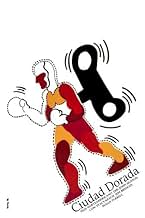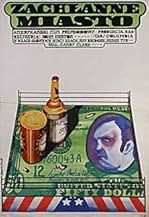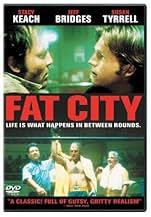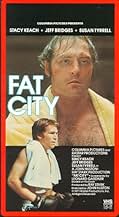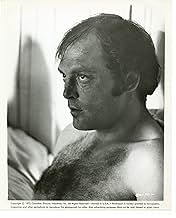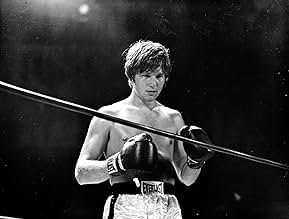CALIFICACIÓN DE IMDb
7.2/10
11 k
TU CALIFICACIÓN
Una mirada a las vidas de dos boxeadores profesionales mientras la carrera de uno crece al tiempo que la del otro mengua.Una mirada a las vidas de dos boxeadores profesionales mientras la carrera de uno crece al tiempo que la del otro mengua.Una mirada a las vidas de dos boxeadores profesionales mientras la carrera de uno crece al tiempo que la del otro mengua.
- Nominado a 1 premio Óscar
- 4 premios ganados y 4 nominaciones en total
Álvaro López
- Rosales
- (sin créditos)
Carl D. Parker
- Paymaster
- (sin créditos)
Bill Riddle
- Boxer
- (sin créditos)
Al Silvani
- Referee at Tully-Lucero Fight
- (sin créditos)
Opiniones destacadas
Fat City has deservedly taken its place among the fine films about boxing that Hollywood has done. It most closely resembles Requiem For A Heavyweight and you get double the entertainment because it's about two boxers in that division whose prospects for success are limited.
Stacy Keach and Jeff Bridges meet at a YMCA gym. Keach a heavyweight who has seen better days was a good prospect to go all the way, but he married the wrong woman who drained him dry and left him. But Keach is a glutton for punishment and he's taken up with Susan Tyrell who is mesmerizing when she's on the screen. Not that the prospects are good for him to hold out for something better, he's no prize either.
But Keach sends Bridges to his former manager Nicholas Colosanto and he also joins them. Bridges has never had a professional fight, but he's clean cut, all American and white. He might be a good draw if he can learn to fight. His debut isn't promising. And he and wife Candy Clark face the problems of all newlyweds.
The air of sadness that hangs around Fat City is that the audience knows full well these guys aren't going anywhere. Keach gets matched with a similar over the hill heavyweight played nicely by Sergio Rodriguez. He barely outlasts him and while the little entourage is celebrating this beginning of a comeback, we see Sergio leave the arena alone as the lights turn out after him. Very effectively staged by John Huston.
The highlight of Fat City is Susan Tyrell who as TCM was showing this film as its prime time feature was reported to have passed away. What an incredible performance as a down and out alcoholic. She received the only Oscar recognition for Fat City as she was nominated for a Best Supporting Actress Oscar.
Boxing fans will appreciate the realistic approach Fat City takes in regard to the sport. Others of us will just like the great performances and realistic filming that typifies Fat City.
Stacy Keach and Jeff Bridges meet at a YMCA gym. Keach a heavyweight who has seen better days was a good prospect to go all the way, but he married the wrong woman who drained him dry and left him. But Keach is a glutton for punishment and he's taken up with Susan Tyrell who is mesmerizing when she's on the screen. Not that the prospects are good for him to hold out for something better, he's no prize either.
But Keach sends Bridges to his former manager Nicholas Colosanto and he also joins them. Bridges has never had a professional fight, but he's clean cut, all American and white. He might be a good draw if he can learn to fight. His debut isn't promising. And he and wife Candy Clark face the problems of all newlyweds.
The air of sadness that hangs around Fat City is that the audience knows full well these guys aren't going anywhere. Keach gets matched with a similar over the hill heavyweight played nicely by Sergio Rodriguez. He barely outlasts him and while the little entourage is celebrating this beginning of a comeback, we see Sergio leave the arena alone as the lights turn out after him. Very effectively staged by John Huston.
The highlight of Fat City is Susan Tyrell who as TCM was showing this film as its prime time feature was reported to have passed away. What an incredible performance as a down and out alcoholic. She received the only Oscar recognition for Fat City as she was nominated for a Best Supporting Actress Oscar.
Boxing fans will appreciate the realistic approach Fat City takes in regard to the sport. Others of us will just like the great performances and realistic filming that typifies Fat City.
Huston always had an eye for characters. His movies almost all dealt with the concerns of lower middle class working joes, the "regular fellows" with whom Huston somehow identified in the romantic Hemingwayesque lantern jawed "a man's gotta do what a man's gotta do" tradition. But his characters were more than mere macho he-men. They displayed genuine and uncommonly powerful vulnerabilities, hopes and dreams, flaws and finally cynicism. After an incredible first 20-plus creative years, Huston floundered for almost a decade with commercial and artistic disappointments (FREUD, THE BIBLE, THE KREMLIN LETTER, SINFUL DAVEY among them) before coming back to his wheelhouse with the carefully subdued yet deeply affecting character study FAT CITY.
FAT CITY is a grand return to form for Huston precisely because it is so indelibly imbued with real life in the form of its unforgettably true characters. None of these people are particularly remarkable individuals (frankly they are mostly below average in self-awareness, skills and intelligence), yet because Huston is so skillful at revealing character through the carefully structured unfolding (and gradual unhinging) of Keach's character, we are given insights which Keach (and Bridges and Candy Clark and the wonderful Nicholas Colasanto) can't make for themselves because they are too close to their own situations. Bridges has a nice interlude and Colasanto is so good in his limited Burgess Meredith Mickeyesque role, but the heart of this movie is Stacy Keach, who rises to the occasion with uncommon subtlety and power. It is a rare movie that can document losers in their daily lives without editorializing or sermonizing. FAT CITY takes an unflinching glance at these people and shows us things which seem prosaic on the surface but which upon examination hide deeper meaning (and heartbreak).
There are no pyrotechnics, no real twists, no witty or stand out dialogue exchanges, not much going on with the camera (though Hall's coloring is as always very well chosen), and very little budget on display in FAT CITY. It appears Huston shot pretty much everything on location in the flophouses around Stockton, CA. Yet the performances are uniformly outstanding and we come to care about these losers as they fumpher through life kidding themselves about where they've been, where they are and where they are going. I can't think of a movie where less actually happens to the characters (maybe BARFLY) but where I still find myself so deeply involved. Whenever I see it playing on the tube I generally stay with it all the way. There are very few movies in that league for me.
Warning: do NOT go in expecting crowd-pleasing Rocky-esque boxing sequences. This is less the story of a Rocky and more the story of a Spider Rico (the "ham n' egger" Rocky beats up in his first fight and from whom we never hear again.) The movie disguises itself as a Horato Alger-like comeback or underdog story initially, but it is ultimately one of the bleakest, realest character studies you're ever likely to see. One of the best Huston movies to come after the 1960s and a downbeat classic. 9/10.
FAT CITY is a grand return to form for Huston precisely because it is so indelibly imbued with real life in the form of its unforgettably true characters. None of these people are particularly remarkable individuals (frankly they are mostly below average in self-awareness, skills and intelligence), yet because Huston is so skillful at revealing character through the carefully structured unfolding (and gradual unhinging) of Keach's character, we are given insights which Keach (and Bridges and Candy Clark and the wonderful Nicholas Colasanto) can't make for themselves because they are too close to their own situations. Bridges has a nice interlude and Colasanto is so good in his limited Burgess Meredith Mickeyesque role, but the heart of this movie is Stacy Keach, who rises to the occasion with uncommon subtlety and power. It is a rare movie that can document losers in their daily lives without editorializing or sermonizing. FAT CITY takes an unflinching glance at these people and shows us things which seem prosaic on the surface but which upon examination hide deeper meaning (and heartbreak).
There are no pyrotechnics, no real twists, no witty or stand out dialogue exchanges, not much going on with the camera (though Hall's coloring is as always very well chosen), and very little budget on display in FAT CITY. It appears Huston shot pretty much everything on location in the flophouses around Stockton, CA. Yet the performances are uniformly outstanding and we come to care about these losers as they fumpher through life kidding themselves about where they've been, where they are and where they are going. I can't think of a movie where less actually happens to the characters (maybe BARFLY) but where I still find myself so deeply involved. Whenever I see it playing on the tube I generally stay with it all the way. There are very few movies in that league for me.
Warning: do NOT go in expecting crowd-pleasing Rocky-esque boxing sequences. This is less the story of a Rocky and more the story of a Spider Rico (the "ham n' egger" Rocky beats up in his first fight and from whom we never hear again.) The movie disguises itself as a Horato Alger-like comeback or underdog story initially, but it is ultimately one of the bleakest, realest character studies you're ever likely to see. One of the best Huston movies to come after the 1960s and a downbeat classic. 9/10.
Fat City is a small film directed on location in Stockton, California by legendary director John Huston.
It is about small time boxers and small time losers. Stacy Keach is a washed up boxer, a drunk, making a comeback but really not up to it. He is in a tempestuous relationship with Susan Tyrell who is magnificent as his drunk girlfriend. The booze oozes out of her pores and she really cracks that paralytic look in her face.
Jeff Bridges is the up and coming boxer but he immediately loses his early fights, he gets his pretty girlfriend, Candy Clark pregnant and gets some irregular work as a labourer sometimes working with Keach in the fields.
There is nothing grandiose or bombastic about Fat City. It really is introverted dealing with the underclass in the early 1970s. The location filming adds a lot of authenticity and rawness.
Keach who was a noted Shakespearean actor of the American stage is very believable. He plays not a has been but a never was, who wants to have that one final crack of something big but he will get nowhere it as he always gets sidetracked, usually by booze.
Bridges at the time was the young up and comer with a mixture of enthusiasm and wide eyed innocence. He was 23 years old when he made this film and was already a veteran with an Oscar nomination to his name as he was a child actor working in his father's show.
A critic pointed out something novel about this boxing film. These almost desperate people we meet go out of their way to be kind to each other no matter how hopeless their situation.
When Keach argues with Tyrell you expect that he will hit her. When her ex-boyfriend turns up, you again expect that he will get in a fight with Keach. However you find people struggling to be nice and civil to each other.
Boxing actually plays a small part in the film. Fat City is a forgotten gem of 1970s cinema.
It is about small time boxers and small time losers. Stacy Keach is a washed up boxer, a drunk, making a comeback but really not up to it. He is in a tempestuous relationship with Susan Tyrell who is magnificent as his drunk girlfriend. The booze oozes out of her pores and she really cracks that paralytic look in her face.
Jeff Bridges is the up and coming boxer but he immediately loses his early fights, he gets his pretty girlfriend, Candy Clark pregnant and gets some irregular work as a labourer sometimes working with Keach in the fields.
There is nothing grandiose or bombastic about Fat City. It really is introverted dealing with the underclass in the early 1970s. The location filming adds a lot of authenticity and rawness.
Keach who was a noted Shakespearean actor of the American stage is very believable. He plays not a has been but a never was, who wants to have that one final crack of something big but he will get nowhere it as he always gets sidetracked, usually by booze.
Bridges at the time was the young up and comer with a mixture of enthusiasm and wide eyed innocence. He was 23 years old when he made this film and was already a veteran with an Oscar nomination to his name as he was a child actor working in his father's show.
A critic pointed out something novel about this boxing film. These almost desperate people we meet go out of their way to be kind to each other no matter how hopeless their situation.
When Keach argues with Tyrell you expect that he will hit her. When her ex-boyfriend turns up, you again expect that he will get in a fight with Keach. However you find people struggling to be nice and civil to each other.
Boxing actually plays a small part in the film. Fat City is a forgotten gem of 1970s cinema.
John Huston's 1972 production of FAT CITY is a masterpiece of film-making and acting. It's more than just a movie of boxing, it's symbolic of the American Dream gone depressingly wrong. Stacy Keach in the finest role of his outstanding career is symbolic of "every-man". His dreams are based on professional successes, which by gaining money and fame, he will be happy in his life. As we know in so many cases, that obtaining fame and money leads many people down an even deeper road of depression and self-destruction. For without emotional success, without love, a person is empty inside. A powerful film. Not a boxing film at all. Boxing is merely the symbolism here; fighting to succeed. "I win the fight and I get my wife back", says Keach's character, Billy Tully.
A great movie, but one that leaves you feeling sad; pondering your own hopes, dreams, and desires. A remarkable supporting cast, high-lighted by a young Jeff Bridges, make FAT CITY one of John Huston's most memorable films. A Champion of movie-making.
A great movie, but one that leaves you feeling sad; pondering your own hopes, dreams, and desires. A remarkable supporting cast, high-lighted by a young Jeff Bridges, make FAT CITY one of John Huston's most memorable films. A Champion of movie-making.
The down-to-earth tale of two small hall boxers -- at the opposite ends of their careers -- and the blows they take in and out of the ring.
This is one of the best American movies ever about normal working class lives where failure is common and the only thing you can do is pretend otherwise or drug it all away to nothing. I know why so many people prefer Rocky to this -- this is too real for them. Indeed it is almost too real for me!
Stacey Keach was given the role of lifetime in this. He really does look like a failing boxer turned to flab (although maybe that is nature -- not punches!) trying to find a life (of sorts) beyond the ring. Bridges really does look and sound like the daydreamer believer that makes the boxing game go round. Johnny No Talent who thinks he is Mike Tyson when his face finally clears up.
They don't make films like this anymore. The Europeans can, although they are rarely shown and end up too self indulgent. Everyone here gets what they deserve, which is sadly, very little. That is what sport is about in real life -- lots of people failing so that are very small few can succeed. The best the majority can hope for is some exercise and comradeship.
(This contrasts with most sports movies -- which are about glory. Or at least glory through struggle.)
This is the best late John Huston film and every single frame is a frame of reality and believability. Maybe that is what leads so many people to say "so what", the world outside their window has many of the same elements and there are many times you feel you are -- indeed -- looking at real life.
This is one of the best American movies ever about normal working class lives where failure is common and the only thing you can do is pretend otherwise or drug it all away to nothing. I know why so many people prefer Rocky to this -- this is too real for them. Indeed it is almost too real for me!
Stacey Keach was given the role of lifetime in this. He really does look like a failing boxer turned to flab (although maybe that is nature -- not punches!) trying to find a life (of sorts) beyond the ring. Bridges really does look and sound like the daydreamer believer that makes the boxing game go round. Johnny No Talent who thinks he is Mike Tyson when his face finally clears up.
They don't make films like this anymore. The Europeans can, although they are rarely shown and end up too self indulgent. Everyone here gets what they deserve, which is sadly, very little. That is what sport is about in real life -- lots of people failing so that are very small few can succeed. The best the majority can hope for is some exercise and comradeship.
(This contrasts with most sports movies -- which are about glory. Or at least glory through struggle.)
This is the best late John Huston film and every single frame is a frame of reality and believability. Maybe that is what leads so many people to say "so what", the world outside their window has many of the same elements and there are many times you feel you are -- indeed -- looking at real life.
¿Sabías que…?
- TriviaAccording to Stacy Keach, Sixto Rodriguez knocked him out during their fight scene and that shot appears in the film.
- ErroresDuring the bar scene, the barrette in Susan Tyrrell's hair moves all over the place from shot to shot.
- ConexionesFeatured in Moviedrome: Fat City (1988)
- Bandas sonorasHelp Me Make It Through the Night
Composed by Kris Kristofferson
Performed by Kris Kristofferson
© 1970 Combine Music Corporation
[Played over opening credits]
Selecciones populares
Inicia sesión para calificar y agrega a la lista de videos para obtener recomendaciones personalizadas
- How long is Fat City?Con tecnología de Alexa
Detalles
Contribuir a esta página
Sugiere una edición o agrega el contenido que falta


